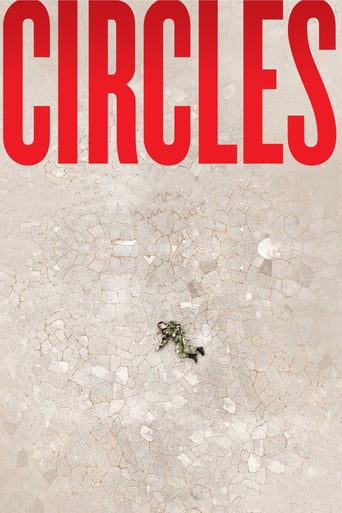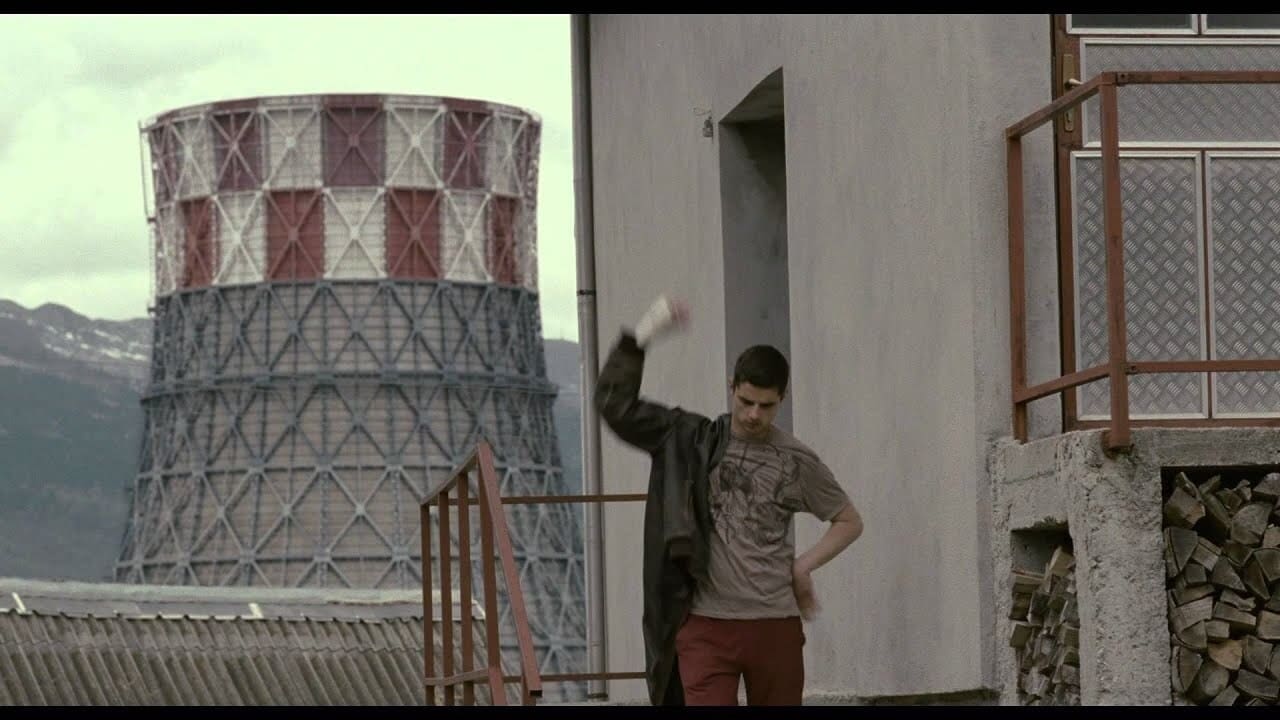Alex Deleon
KROGOVI (Сircles): Serbian, 2013 Director Srdan Golubović A Serbian film with Slovenian, Croatian and German production inputs.After a fast start in Trebinje, Montenegro, 1993, introducing the principal characters of the drama, the time moves forward twelve years to Halle, Germany, and then to Belgrade, Serbia, and the pace slows down considerably with lots of real time sequences and lingering shots on pensive faces as the movie lapses into a study of the consequences of an act of collective brutality -- simply put, an outrageous war crime, during the brutal Jugoslavian civil war, a dozen years later. On various people who have tried to put it behind them. At the opening, Marko, a Serbian soldier off duty intervenes in the brutal beating of an innocent Moslem civilian being savaged by some of his soldier mates as the townspeople look on passively.This humane act will have very complex and puzzling repercussions which will not be resolved until the very end when we finally see what happened to Marko as a result of his attempt to save an innocent person from a pointless murder by his mates. This very tense drama that was roundly applauded by the Hungarian (Miskolc) audience and followed by a lengthy Q and A session with the director on stage after the screening. The civil war that tore Jugoslavia apart at the beginning of the nineties is now 20 years behind us but in the region itself the repercussions are still much like an open woundCircles, aka Krugovi, is based on the true story of a Serbian soldier who was killed defending a Muslim civilian from other soldiers while he was off-duty. Most of the story takes place a decade after the end of Serbian-Bosnian conflict but the effects of the war keep reaching out like ripples on a pond when a heavy stone is thrown in. Expanding concentric circles of guilt that keep disturbing the otherwise smooth surface of the water -- the 'krugovi' of the title -- that affect among others a Serbian family that has started a new life in neutral Germany, but the past comes back to haunt them. A surgeon who was only a medical student at the beginning is faced with the dilemma of whether to operate and save the life of a new patient, or not to operate and let him die when he recognizes the patient as the killer of his best friend back in Trebinje years before. But the former killer taunts him by reminding him that he was of the bystanders who did nothing to prevent the killing on that fatal day. All of this is cunningly directed like an intertwined nest of mystery stories embedded in each other until the surprise revelation at the end. While the story is specifically Yugoslavian the morality involved is universal and the filming is so masterful that this movie will hold the attention of audiences anywhere. Can't wait to see more work by Srdan Golubović.
dragokin
Krugovi (Circles) explores the consequences of civil war in former Yugoslavia, which is still a very sensitive subject in the area. The discussion surrounding such a movie usually overshadows its message. Due to the complex nature of the conflict and numerous parties involved, movies about this particular civil war tend to paint a simplified picture and imply how one of the sides were "more guilty". This might not be interesting or even anticipated by an unacquainted viewer, yet it takes a toll on the artistic merit of the movie. Angelina Jolie's In the Land of Blood and Honey (2011) is probably the best example.The authors of Krugovi (Circles) overcame this challenge by a script in which the main protagonists are mostly Serbs. A group of Serbian soldiers kicks off the storyline and their actions would influence their lives and the lives of the people around them even twelve years later.Probably the best thing about this movie is its atmosphere. The grinding sadness almost pours from the screen. However, this is not a tragedy, rather a story about common people whose small deeds might make the world a better place although they won't right the wrongs of the past.Krugovi (Circles) is so far the best feature film by the Srdan Golubovic. According to IMDb.com he directed only three feature films, yet he displayed an amazing ability to improve his output throughout his career. This one set the bar pretty high and it is with great expectation that i await his next movie.
maurice yacowar
In Circles, Serbian director Srdan Golubovic dramatizes the need for warring factions to move beyond their animosities. The film is framed by the start and the end of a scene in Bosnia, 1993, based on an actual event. The golden Serbian off-duty soldier Marko sees three colleagues brutalize a Muslim civilian, the tobacconist Haris. When Marko intervenes, Haris runs off but the soldiers turn on Marko and kill him. Marko's young doctor friend watches helpless, while other citizens look away.The bulk of the film shows the characters still dealing with that death in Serbia, 2008, their wounds having outlived the war. Marko's fiancée Nada drifted off after her loss, married a brute and is now trying to escape his menacing pursuit of their young son. Haris helps her find a job and flat, then pays for her son's passport to enable her escape to Bosnia, where her husband faces arrest. The husband gives Haris a second severe beating but refrains from killing him, his eyes tearing up when he realizes he has lost his son. Marko's aging father Ranko is still alienated from the widow of one of Marko's assailants. He refuses to employ their grown son on his project, to relocate an old stone church from the power plant to a country hilltop. The church is an emblem of taking the moral high road. At the young man's persistence the old man softens, gives in, comes to accept him, and as he speeds him to a hospital after an accident cradles his head and tells the driver the boy is his son. Haris phones Ranko on the anniversary date of Marko's death. Now he calls him after this second beating. Though living in Germany now, Haris repays his debt to Marko by attending to his survivors. Marko's doctor friend is now the only surgeon who can perform the operation that will save the life of Todor — the leader of Marco's assault — after a serious traffic accident. The man recognizes him and futilely tries to get a different surgeon. The doctor is at first unwilling to save his friend's killer's life, especially when the brute denies remorse and calls him a "pussy" for his moral considerations. Post-operation this brute too tears up in gratitude for having been saved. One recurring motif is the long shot of a long winding road, like the one down which Ranko drags the crippled worker. It's an emblem of the long route to redemption, through forgiveness.The title has two implications. At one point Ranko muses that a stone dropped in water sends out spreading circles, but a good man's deeds don't. In this film Marko's death ends up having positive effects on the others, on Haris immediately and on the others up to 12 years later. They manage to break the circle of violence and hatred begetting violence and hatred. For more see www.yacowar.blogspot.com.
sevastokrator
In a war-infested country, behind the lines, a soldier on leave interferes to save the life of an innocent man from another ethnic group, being beaten by his fellow soldiers. He ends up being beaten to death instead.20 years after the war, one finds himself thinking about who were the true war heroes. An utterly pointless act, to risk your own life in a havoc in which a human life is wasted in the blink of an eye, for someone you barely know, is something one can see only on screen. In reality, most of us are those who watch, who witness, but dare not interfere.One man did interfere, and lost his life, seemingly pointlessly. The only child of a widowed father, with a fiancée whose life would become a sad and tragic story of a drifter afterwards, and the gang of murderers sentenced to ridiculously short sentences. Was it worth it, are good deeds worth it in general? There's an ironic English proverb saying that no good deed goes unpunished. But the story tells that even a rock thrown in water makes circles that grow and spread. In this case, circles of compassion that go through space and time and inspire many. Circles that help us find inner courage to stand up to injustice, that help us find the compassion to restrain us in revenge upon the innocent.This film was inspired by a true story. The story of Srđan Aleksić, a Serbian soldier on leave who was beaten to death in 1993 by his fellow men, while trying to save Alen Glavović, an innocent Muslim civilian, who was being beaten before him. Out of the four rascals, only one expressed regret in the court. Ironically, he was the only one to meet death shortly, within a couple of months, shot on the front line, where all four were sentenced to. Srđan's father wrote in his son's obituary "He died fulfilling his human duty".The circles that the rock of Srđan's deed made are those which eventually made him the only war-hero respected and cared for on all the opposed sides. What strikes me most were Christ's words that "Greater love has no one than this, that someone lay down his life for his friends." Those circles keep showing us that such deeds of the greatest love are possible and were made by a man who had lived among us, and who never lived to see his family growing and his children being born, unlike us, the silent witnesses, who take so much pride in love we feel and share.The names are altered and the rest of the story is entirely fictional. Being a person from the region, there was little in the film for me not to be fully understood and grasped. Therefore, I am somewhat reluctant to recommend it to worldwide audience, fearing if its universal message would break through the local context it took place in. But I do. Here is an excellent, slow and heavy Serbian drama with little action, much dialogue and fine acting, telling us the aftermath of a well known story, and circles of compassion, forgiveness, courage and inner purification.R.I.P. Srđan Aleksić 1966 — 1993


 AD
AD



